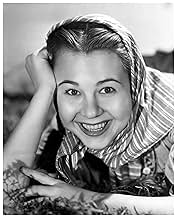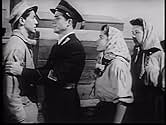Adicionar um enredo no seu idiomaA Ukrainian village must suddenly contend with the German invasion of June 1941.A Ukrainian village must suddenly contend with the German invasion of June 1941.A Ukrainian village must suddenly contend with the German invasion of June 1941.
- Direção
- Roteiristas
- Artistas
- Indicado a 6 Oscars
- 6 vitórias e 6 indicações no total
Avaliações em destaque
Reading the posts on the movie here, it appears to me that some commentators really miss the whole point of US propaganda at the time and condemn The North Star out of context. These responses suggest to me that The North Star's punch has lost none of its original power.
Made at the request of President Roosevelt, this fictional Sam Goldwyn independent production recreates the Soviet side of WWII by taking us into the lives of a small town family, apparently Ukrainian. The cast is stellar, with writing by Lillian Hellman, music by Aaron Copland, lyrics by Ira Gershwin (it's very musical)...you get the idea? This propaganda film pulled no punches. But it's troubled in a lot of ways, not the least of which is its goody-goody view of Russian life that makes Russian propaganda look accurate. Dana Andrews is a breath of fresh air, but really, do they have to have him singing and playing the balalaika while walking a country road? Smiling? But in uniform, which is key. Luckily, Andrews is thoroughly great in the rest of the film. But I decided to watch this film for another reason: James Wong Howe. Yes, his cinematography is quite stunning, and virtuosic through a range of styles. Much of the first part of the film is in a kind of brightly lit quasi-documentary style, with lots of hearty happy faces, all tightly framed and with some key moving camera to keep it real. Some of the family scenes inside are filmed with beautiful rich contrast. But what a quirky film in so many ways. It's heroic, for sure. When it gets to the war parts it's gripping and much more realistic. But there is consistent music, which was a surprise. Even Walter Brennan sings. But the bulk of the film is the war scenes, and they are impressive. Most of the film was shot at the Samuel Goldwyn studios, and it feels convincing. Walter Huston is commanding, and good old Erich von Stroheim takes on an ugly role with gusto. Lewis Milestone directs much of this mishmash with a feeling of a 1936 film, the characters simple and overly idealized as if fighting the Depression with dignity. The early war scenes (many shot with decent back projection) save the film, but in a way they are meant to be context for the human dramas of the town folk. It is when the war enters the village that the elements all meet and the movie rises up. By the end, it is the obvious writing that pulls the movie down and the stunning photograrphy that saves it.
The interesting film is a gripping war story with valiant villagers facing on Nazis.This unnerving epic depicts the horror war as Nazi atrocities and as the resistance fighters roam the Russian countryside attacking during the invasion. Although melodramatic moments in overall effects, also has moments of astounding power with some overwhelming sequences. Thought-provoking screenplay amid much feuding writer Lillian Hellman and producer/director , and Hellman told her disappointment on the adaptation. The credits are extraordinaries, prestigious actors, Walter Huston as the village medic, Dana Andrews, Farley Granger in his first role along with Anne Baxter, Erich Von Stroheim as usual official Nazi, Dean Jagger, among them.Cinematography supplied by the master James Wong Howe and score by the classic Aaron Copland with lyrics by Ira Gershwin.
The motion picture is well directed by Lewis Milestone, he was born in the Ukraine(where is set the movie), but emigrated to America at 18 and he served in WWI. He often made chronicles of wartime conflicts and persisted in showing horror war from the point of view of the ordinary soldier. As he showed WWI(All quiet on the western front), WWII(A walk in the sun,Purple heart, Halls of Motzuma,Edge and darkness) and Korean war(Pork Chop Hill); and directed several other excellent movies in different fields, drama(Of mice and men, Strange love of Martha Ivers), adventures(Mutiny on the Bounty) and heist-comedy(Ocean's eleven), among others.
Other posters to this site have commented on the folk-peasant musicale that dominates the first half-hour of the film, so I'll dispense mention of it here. Suffice it to say, however, that from the first scene of violence -- a merciless daytime bombardment of civilians on a quiet Ukrainian country road -- the film gathers emotional strength. And when Anne Baxter, playing a schoolgirl, gazes for the first time upon the horrific vision of her school chums, now dead as the result of mechanized warfare, she states evenly, "We're not young anymore." She and a few others escape into the forest, emerging now and then to engage in hit-and-run sabotage against the Nazi aggressors. The film builds to a climax in which Russian partisans astride horses attempt to take back their village from the better- equipped Germans, giving director Milestone an opportunity to reprise the long tracking shots of approaching figures that became his trademark visual motif.
When Samuel Goldwyn produced "The North Star," he pulled out all the stops. He enlisted James Wong Howe to photograph, William Cameron Menzies to design the production, and Aaron Copland to write the background score. The cast, besides Baxter, includes Dana Andrews, Farley Granger, Walter Huston, and, as the Nazi You Love to Hate, the legendary Erich Von Stroheim, as a German military doctor who compromises his professional oath through medical experimentation. Supplies of blood for the German wounded have dried up, so Dr. Von Stroheim orders the village children rounded up and brought to the local school, where he draws great quantities of blood from them -- so much so, that a few kids die from the process. Effective and highly dramatic, it certainly beats visions of the Hun boiling Belgian babies in oil.
Você sabia?
- CuriosidadesFilm debut of Farley Granger.
- Erros de gravaçãoWalter Brennan and Farley Granger ambush 3 German soldiers, as one is about to throw a grenade he drops it but it doesn't go off.
- Citações
Dr. von Harden: [while Dr. Kurin is holding a gun on Richter and von Harden] I do not like much of what I've done for the past nine years.
Dr. Pavel Grigorich Kurin: [after von Harden has given a blood transfusion from a Russian child to a German soldier] You do not like bleeding children?
Dr. von Harden: Did the boy die?
Dr. Pavel Grigorich Kurin: [Contemtuously] You knew he would die!
Dr. von Harden: They took too much blood. I'm sorry for that.
Dr. Pavel Grigorich Kurin: Yes, I nelieve you when you say you are sorry.
Dr. von Harden: I'm sorry for many things, Dr. Kurin. Most of all that this is not the world we used to know.
Dr. Pavel Grigorich Kurin: I've heard about you... civilized men who are sorry. This...
[Contemptuously gesturing toward Richter]
Dr. Pavel Grigorich Kurin: This kind is nothing! They will go when their bosses go, but men like you who have contempt for men like him! To me you are the real filth... men who do the work of Facists while they pretend to themselves that they are better than the beasts for whom they work... men who do murder while they laugh at them who order them to do it. It is men like you who have sold their people to men like him.
[He points to Richter and shoots him at point blank range]
Dr. Pavel Grigorich Kurin: You see, Dr. von Harden, you were wrong about many things. I AM a man who kills!
[He shoots von Harden at point blank range too]
- Versões alternativasIn 1956, the film was sold to television and re-edited under the title "Armored Attack." 25 minutes were removed, including all references to the word "comrade," and with the help of voice-over narrations, turned the alleged pro-Communist piece into anti-Communist territory.
- ConexõesFeatured in Sprockets: Masters of Menace (1995)
Principais escolhas
- How long is The North Star?Fornecido pela Alexa
Detalhes
- Data de lançamento
- País de origem
- Idiomas
- Também conhecido como
- A Estrela do Norte
- Locações de filme
- Empresa de produção
- Consulte mais créditos da empresa na IMDbPro
- Tempo de duração1 hora 48 minutos
- Cor
- Proporção
- 1.37 : 1





































